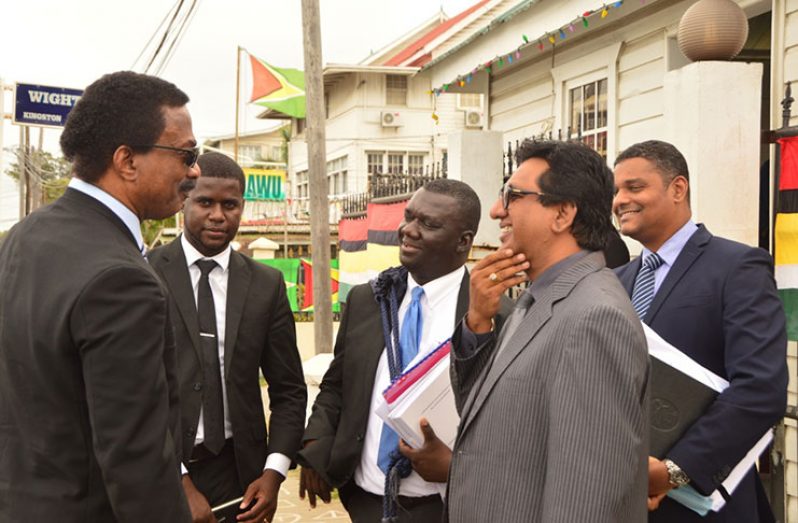— judge says no need for urgency exists
— oral arguments on conservatory order, stay on no-confidence cases set for March 15
COURT of Appeal Judge Rishi Persaud said at this stage, there is no urgent need for an interim stay to be granted to halt the decision of the High Court in the no-confidence motion matter.
At the time, Justice Persaud was responding to Attorney General Basil Williams, who during a case management session at the Appellate Court on Thursday, indicated on a point of record that he had applied for an interim stay to freeze the decision of Chief Justice, Roxane George-Wiltshire, that the no-confidence motion against the government was validly passed, and a conservatory order to preserve the status quo of the Cabinet.
In defending his application, the attorney general pointed out that in 2016, the Court of Appeal had granted an interim stay of execution in the Desmond Morian Case, which resulted in Minister of Citizenship, Winston Felix, and Minister within the Ministry of Social Protection, Keith Scott, being allowed to sit as Members of Parliament (MPs) until the case was heard fully. The then Chancellor, Justice Carl Singh, had presided over the matter.
But in response, Justice Persaud said: “I don’t see the need… the absolute urgency for the stay at this time.” The appellate judge had moments ago set strict timelines for submissions of arguments on the stay of executions and conservatory orders being sought in three separate cases to halt the January 31 decision of Justice George-Wiltshire, and to preserve status quo of Cabinet and the government. According to the timelines, oral arguments in the cases – The Attorney General v Christopher Ram and Leader of the Opposition; The Attorney General v Speaker of the National Assembly, The Leader of the Opposition, and Joseph Harmon; and Compton Reid v The Speaker, Charrandass Persaud, the Attorney General, the Opposition Leader and Joseph Harmon – will be heard on Friday, March 15, 2019. Between March 4 and March 14, 2019, the parties in all the cases will submit written arguments.
“Having regarded the strict time limits that I have just set, I am not minded to do that, grant a stay…I am not minded to do that at this stage because we are still well within the time,” Justice Persaud told the attorney general.
The attorney general appeared on Thursday in association with the Solicitor General Nigel Hawke, and Attorneys-at-Law Maxwell Edwards and Mayo Robertson.
The Opposition Leader, Bharrat Jagdeo, was represented by Attorney-at-Law Anil Nandlall, while the Speaker of the National Assembly, Dr. Barton Scotland was represented by Senior Counsel, Rafiq Khan. In the case Compton Reid v The Speaker, Charrandass Persaud, the Attorney General, the Opposition Leader and Joseph Harmon, Reid was represented by Legal Counsel, Robert Corbin while Charrandass Persaud was represented by Sanjeev Datadin, and Roysdale Forde appearing on behalf of Minister of State, Joseph Harmon.
In the Affidavit in support of the summons in the case of the Attorney General v The Speaker and Leader of the Opposition, State Counsel, Raeanna Clarke, swore to the affidavit.
Clarke said based on the advice of her lawyers, she believes that the chief justice erred and misdirected herself in law when she ruled that the motion of no-confidence upon a division vote of 33:32 Members of the National Assembly was validly passed as the requisite majority of all the elected members of the National Assembly pursuant to Article 106 (6) of the Constitution.
The State counsel stated that the chief justice miscalculated the majority of all elected members of the National Assembly as required under Article 106(6) of the Constitution, for the government to be defeated on a vote of no-confidence. “In order for the government to be defeated on a vote of no-confidence, 34 or more votes of all the elected members in favour of the motion was required instead of 33,” she contended.
According to her, an absolute majority is calculated as half plus one and where, mathematically, half of all the elected members of the Parliament would result in a fraction, the method of calculation of the absolute majority is that the fraction is rounded to the next whole number and one added to result in a number greater than half.
Clarke put forward similar arguments in her affidavit in the case of Christopher Ram v the Attorney General and Opposition Leader.
“It is contended that the effect of the ruling of the Chief Justice, that Cabinet ceased with immediate effect on the night of the no-confidence motion on 21st December 2018, will mean that the government will be unable to introduce any financial bills for passage because, in accordance with Article 171 of the Constitution, these bills require the recommendation and or consent of the Cabinet signified by a minister.
In these circumstances, the government will be unable to fund the preparation and holding of elections by the Guyana Elections Commission (GECOM) if the effect of the ruling of the chief justice is not stayed as prayed for herein,” Clarke stated.
She said it is contended that the status quo ante is that the President, Cabinet and government will continue in their role and functions until the hearing and determination of the appeal herein.
State counsel said she believes that the Conservatory Order is necessary to preserve the status quo ante, as the period for the hearing and determination of the matter may expire before that time prescribed in Article 106 (7) of the Constitution which requires that the President and government remain in office and hold elections within three months.
Reid, through his attorneys Rex McKay, S.C, Neil Boston, S.C and Robert Corbin, has applied for a Conservatory Order and stay of executions on similar grounds. Reid had challenged the validity of Charrandass Persaud’s vote in the National Assembly on the basis that he breached the Constitution by having dual citizenship while being a Member of Parliament.




.png)









